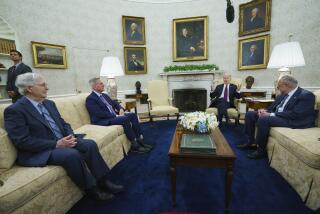Putting Priorities in Order
- Share via
Dividends result from investments. Peace dividends from the federal budget as the Cold War winds down will be no exception.
This becomes ever clearer as economists and others try to match the amounts of money that would be freed up by smaller Pentagon budgets with what it will cost to cut the federal deficit, reform education, explore space, clean up the environment, patch up the national transportation system and tend to other public business too long on hold. There is no match.
Just trimming the deficit would take more money than the Pentagon seems likely to save with an orderly budget retreat. The deficit for the fiscal year that ended last September was $152 billion. The Gramm-Rudman budget-reduction law requires the deficit in the budget President Bush will send to Congress this month to be $40 billion less than that. Congress strained its back lifting $14 billion out of its last budget. It is not likely to get well in time to lift $40 billion.
So bad is the match between the peace dividend and domestic need that a proposal from Capitol Hill that would have made perfect sense just years ago seems inadequate now. Rep. Lee H. Hamilton (D-Ind.), chairman of the Joint Economic Committee of Congress, wants to mix $25 billion worth of higher taxes with $25 billion of budget cuts for fiscal 1991. In his annual report, he sees the package as a way to break the deadlock between Congress and President Bush. Democratic leadership on the Hill generally agrees that some taxes need to go up. The President not only resists talk of higher taxes but also probably will make another effort this year to cut at least one, the tax on capital gains.
Against this background is a growing sense among both liberal and conservative analysts that Washington has neglected what were once called public works--and now is known as the infrastructure--for as long as it dares. The backlog of building and repair of bridges, water systems, roads, sewage treatment plants and the like is generally put at between $400 billion and $500 billion. Some of the estimates may be inflated, but no lobbyist wrote the federal estimate that one bridge in six along the Interstate Highway System needs repair. These are not antique wooden bridges over backwaters; they are the best the country has.
One economist, David Anschauer of the Federal Reserve Bank of Chicago, has compared rates of productivity and of public works and thinks the numbers show that falling investment in infrastructure accounts for much of the recent decline in the output of American workers. Estimates like these argue not for cuts in the budget but for increases--and they do not even include money for education and retraining, for cleaning up the radioactive mess around nuclear weapons factories or paying for the savings and loan disaster.
Even if Hamilton’s dollar figures seem small, his report at least provides a place to start a serious discussion about the next generation of priorities in America. Since last August, many Americans have been riveted by the spectacle of freedom sweeping through Eastern Europe. What Hamilton has done is tap those Americans on the shoulder to remind them that watching Europeans try to set in order the houses they have reclaimed from tyrants is, after all, a spectator sport. While spreading asphalt and distributing textbooks are not as grand and exhilarating as what is happening in Europe, America’s house needs to be put in order, too.
More to Read
Get the L.A. Times Politics newsletter
Deeply reported insights into legislation, politics and policy from Sacramento, Washington and beyond. In your inbox twice per week.
You may occasionally receive promotional content from the Los Angeles Times.








